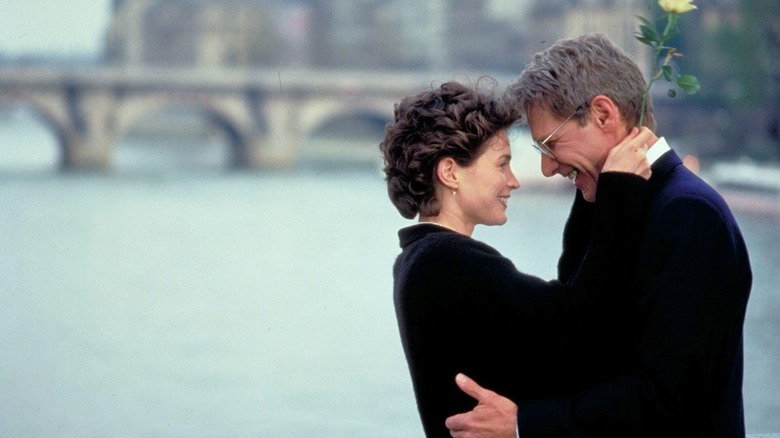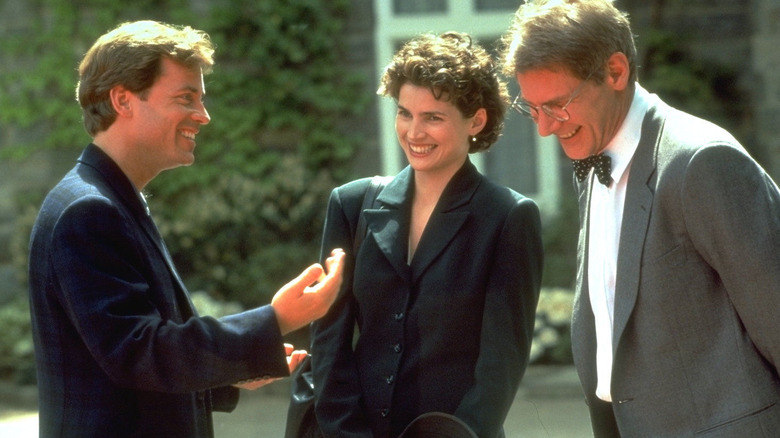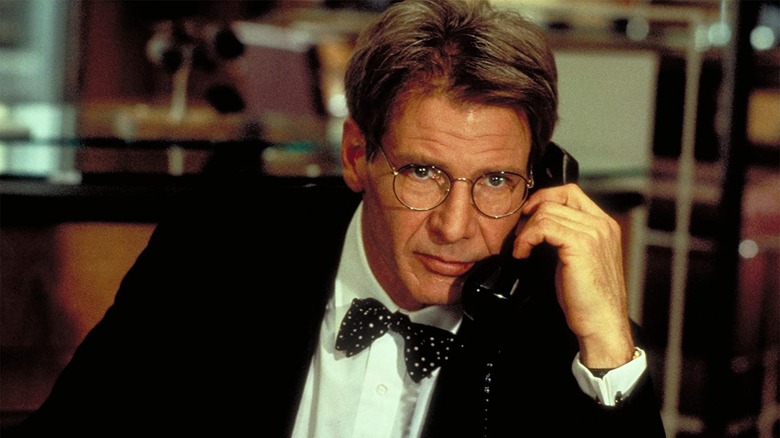Harrison Ford Had To Learn To Let Go Of His Ego On The Set Of Sabrina
Of all the films to remake, Billy Wilder's 1954 romance "Sabrina," seems — at first glance — like something of an odd choice. A beloved classic starring Audrey Hepburn, Humphrey Bogart, and William Holden, "Sabrina" tells the story of a chauffeur's daughter (Hepburn) who grows up in the orbit of her father's ultra-wealthy bosses. Sabrina has always secretly loved the family's young, handsome caddish lothario son David (Holden), but was looked out for, distantly, by his older brother Linus (Bogart). After leaving home to attend Le Cordon Bleu for several years, Sabrina returns with confidence, sophistication, and a nice new haircut. Only then does David notice her, and aims to seduce her, despite being already engaged. In a Shakespearean, comedic twist, however, David will be removed from the story, and Linus will have to seduce her and reject her to keep her and David separated. No points for guessing that Sabrina and Linus fall in love.
Sydney Pollock's 1995 remake follows these same plot beats nearly exactly. Sabrina is played by Julia Ormond, Linus by Harrison Ford, and David by Greg Kinnear. Like the original, Pollock's version feels light, but also adult. This is a film about the ultra-wealthy, stuffy, business-obsessed Linus realizing his humanity and growing a heart. "Sabrina" is not often mentioned, but it is a sparkling, appealing romance about adults, bad decisions, and kooky upper-class twits.
While Ford might possess the same kind of gruff, wry humor that Bogart had once mastered, he was concerned about playing a character like Linus. In a 1995 interview with Moving Picture Show, Ford once talked about his trepidation about playing a character who shared so few experiences with the actor personally.
What happened to Linus?
Linus is obsessed with business in "Sabrina." When the family has well-moneyed parties, he's back in the house, trying to sell durable flat-screen TVs to foreign investors. He doesn't party, and has been stuck managing the finances of his brother who does. He is largely humorless, and his relationship with his mother (Nancy Marchand) is affectionate but also based on a mutual passion for the family's wealth and business dealings. How could someone, Ford had to ask, become so buttoned-down?
"As an actor, you always have to work out of your own head, you have to work from your own personality. So I said to myself, `What if this happened to me? What if I were so obsessed with my career and I didn't take time for my family? Or if I got to the point where I'd go out with a woman once or twice, lose track of her, and just go back to work?' Which I think is what happened to Linus."
Ford even admits that Linus, in being unused to human interaction, ends up treating Sabrina quite badly throughout the middle portion of the film. He credits Pollock, however, for assuring audiences understand that it is part of an evolution, and one that can be funny and moving at that.
"[T]hat's Sydney's particular genius: He brought it right to the edge where comedy and tragedy commingle. The Linus who manipulates Sabrina, who lies to Sabrina, who seduces Sabrina — while, at the same time, he is seduced by Sabrina, much to his surprise — all of that is strong emotional stuff. And it feels real while you see it. And that's why the comedy works so well. And why the romance works so well. Because there's that acknowledgment that the other side of the coin is there, too."
Ford's ego
By 1995, Ford — then 53 — was one of the biggest movie stars working, having been involved in any number of adventure blockbusters, and proven himself as an intense and intimate actor of dramas. He had reached a point in his career where he was permitted to shape his characters with the filmmakers to match his strengths or give him the types of acting challenges he wanted. Linus was different. Because the character was so far out of Ford's wheelhouse, he admits that he had to give his usual amount of creative control over to Pollock. That required letting go of some "movie star" ego.
"[It was] partly out of fear and partly out of ego. [It was] very hard to give up a certain amount of control to Sydney. But, you know, I went into this saying, `Sydney, I want you to direct me. I don't want to have anything to do with the script. Go away and work on it with the writers. And when it's finished, just tell me where to stand.'"
Some actors are more comfortable taking direction as it comes, and prefer not to interfere with too much of their own input. Others would rather workshop a piece until it fits them better. Ford, in learning how to be the former over the latter, was immensely challenged by "Sabrina." Ford talked in the same interview about his ambivalence toward his own fame. On the one hand, he like the opportunities — and wealth — it affords him. On the other, he can no longer be anonymous.
"Storytelling is a wonderfully fulfilling profession, But the rest of it [being a star] is not my job. It's an optional extra. You want that? You want to go to the parties? You want to be seen? You want people talking about you in the newspaper columns? You can have that if you want. But if that doesn't appeal to you, then you have this other thing. Option B is: the luxury of your circumstances will allow you to purchase seclusion, privacy, beauty. And you can dip in and have a little taste of Option A from time to time. But only if you like."
"Sabrina" offered Ford an opportunity to develop an additional practical skill as well:
"And they said that I couldn't tie a bow tie. Well, let me tell you: I can tie a bow tie ... It just takes me a while, that's all. About, oh, a half-hour or so."


